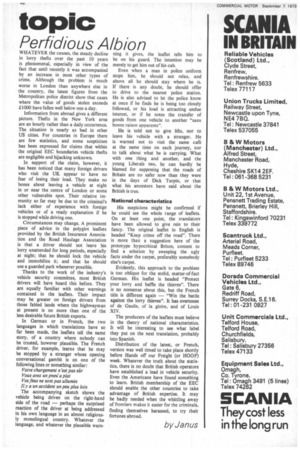topic
Page 50

If you've noticed an error in this article please click here to report it so we can fix it.
Perfidious Albion
WHATEVER the causes, the steady decline in lorry thefts over the past 10 years is phenomenal, especially in view of the fact that until recently it was accompanied by an increase in most other types of crime. Although the problem is much worse in London than anywhere else in the country, the latest figures from the Metropolitan police district show that cases where the value of goods stolen exceeds 11000 have fallen well below one a day.
Information from abroad gives a different picture. Thefts in the New York area are an hourly rather than a daily occurrence. The situation is nearly as bad in other US cities. For countries in Europe there are few statistics, and some scepticism has been expressed for claims that within the original EEC boundaries vehicle thefts are negligible and hijacking unknown.
In support of the claim, however, it has been noticed that many foreign drivers who visit the UK appear to have no fear of losing their load. They make no bones about leaving a vehicle at night in or near the centre of London or some other vulnerable spot. Their relative immunity so far may be due to the criminal's lack either of experience with foreign vehicles or of a ready explanation if he is stopped while driving one.
Circumstances may change. A prominent piece of advice in the polyglot leaflets provided by the British Insurance Association and the Road Haulage Association is that a driver should not leave his lorry unattended for long periods, especially at night; that he should lock the vehicle and immobilize it; and that he should use a guarded park whenever possible.
Thanks to the work of the industry's vehicle security committee, most British drivers will have heard this before. They are equally familiar with other warnings contained in the leaflets. Their impact may be greater on foreign drivers from those fabled lands where the highwayman at present is no more than one of the less desirable future British exports.
In German or in French, the two languages in which translations have so far been made, the leaflets tell the same story, of a country where nobody can be trusted, however plausible. The French driver, for example, learns that he may be stopped by a stranger whose opening conversational gambit is on one of the following lines or something similar: Votre chargement n'est pas sr Vous avez un pneu' a plat Vos feus ne sent pas a llumes fly a an accident an pea plus loin
The accompanying sketch shows the vehicle being driven on the right-hand side of the road — perhaps the surprised reaction of the driver at being addressed in his own language in an almost religiously monolingual country. Whatever the language, and whatever the plausible warn
ning it gives, the leaflet tells him to be on his guard. The intention may be merely to get him out of his cab.
Even when a man in police uniform stops him, he should not relax, and above all he should stay where he is. If there is any doubt, he should offer to drive to the nearest police station. He is also advised to let the police know at once if he finds he is being too closely followed, or his load is attracting undue interest, or if he notes the transfer of goods from one vehicle to another "sans bonne raison apparente-.
He is told not to give lifts, nor to leave his vehicle with a stranger. He is warned not to visit the same cafe at the same time on each journey, nor to talk about what he is carrying. What with one thing and another, and the young Liberals too, he can hardly be blamed for supposing that the roads of Britain are no safer now than they were in the days of Dick Turpin, or that what his ancestors have said about the British is true.
National characteristics His suspicions might be confirmed if he could see the whole range of leaflets. On at least one point, the translators have been allowed to give rein to their fancy. The original leaflet in English is headed "Keep crime off the road". There is more than a suggestion here of the prototype hypocritical Briton, content to find a solution by sweeping the ugly facts under the carpet, preferably somebody else's carpet.
Evidently, this approach to the problem is too oblique for the stolid, matter-of-fact German. His leaflet is headed "Protect your lorry and baffle the thieves". There is no nonsense about this, but the French title is different again — "Win the battle against the lorry thieves". It has overtones of' de Gaulle, of la gloire, and of Louis XI V.
The producers of the leaflets must believe in the theory of national characteristics. It will be interesting to see what label they put on the next translation, probably into Spanish.
Distribution of the latest, or French, version was well timed to take place shortly before Hands off our Freight (or HOOF) week. Whatever the truth about the statistics, there is no doubt that British operators have established a lead in vehicle security. Even the Americans have found something to learn. British membership of the EEC should enable the other countries to take advantage of British expertise. It may be badly needed when the whittling away of frontiers makes it easier for the criminals. finding themselves harassed, to try their fortunes abroad.
by Janus








































































































































